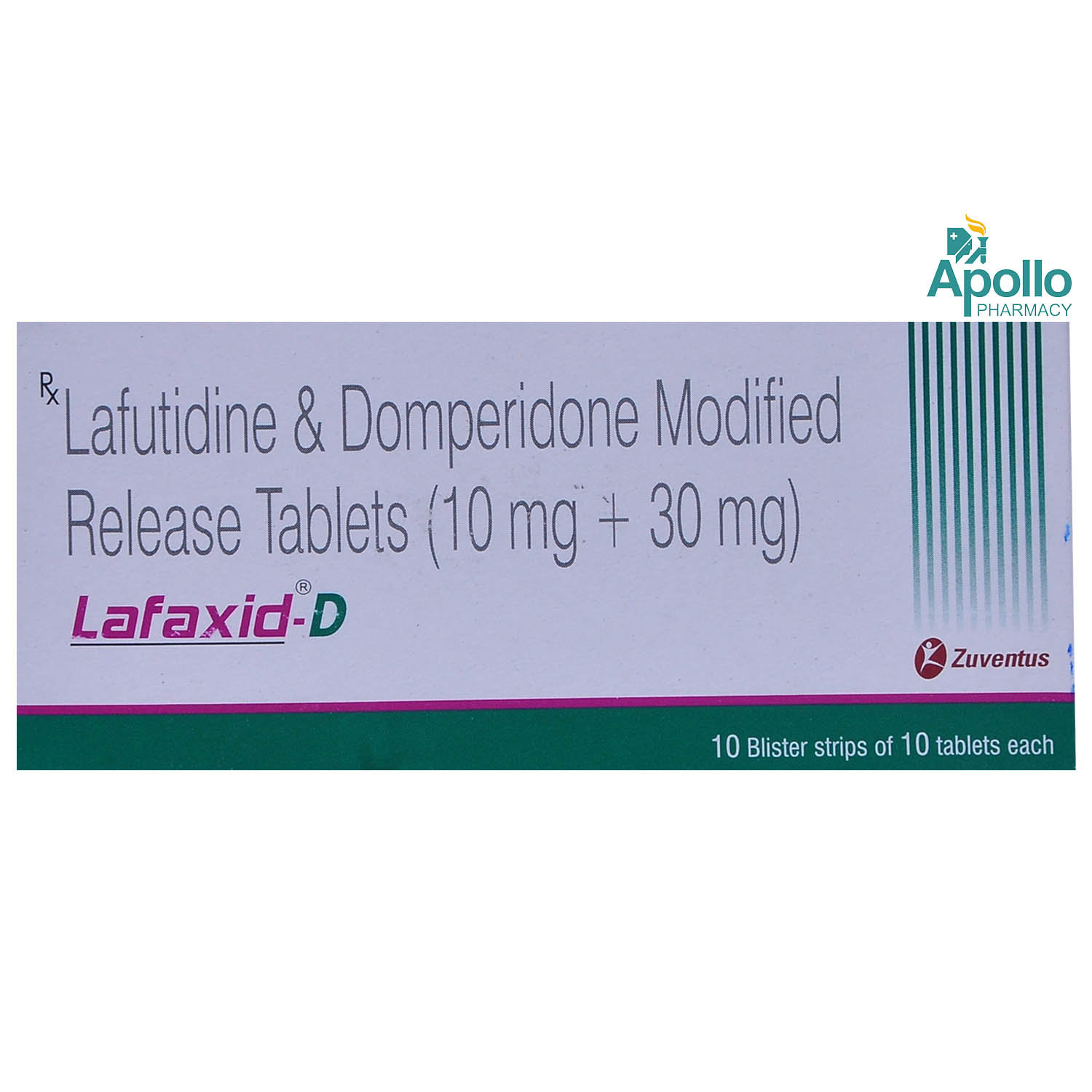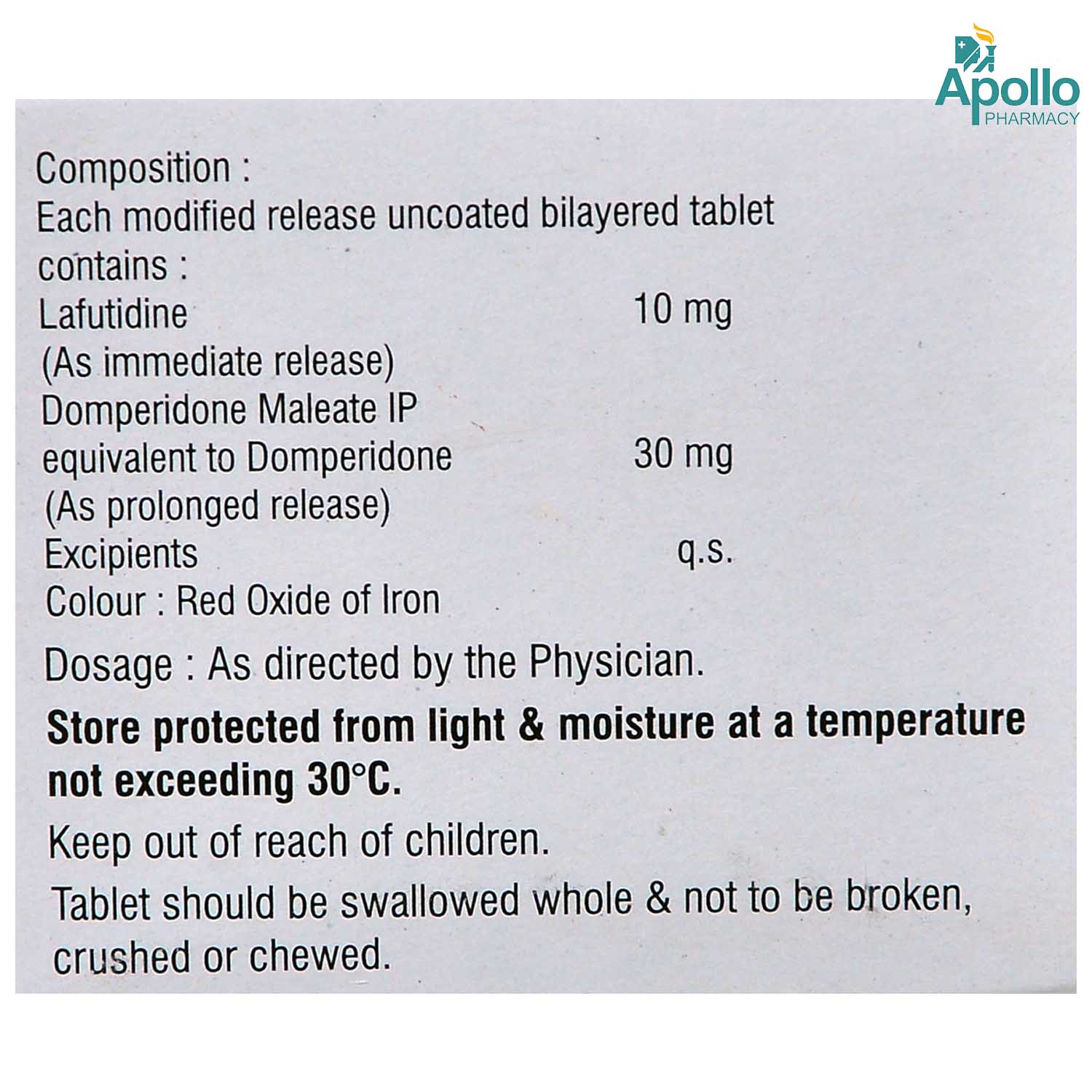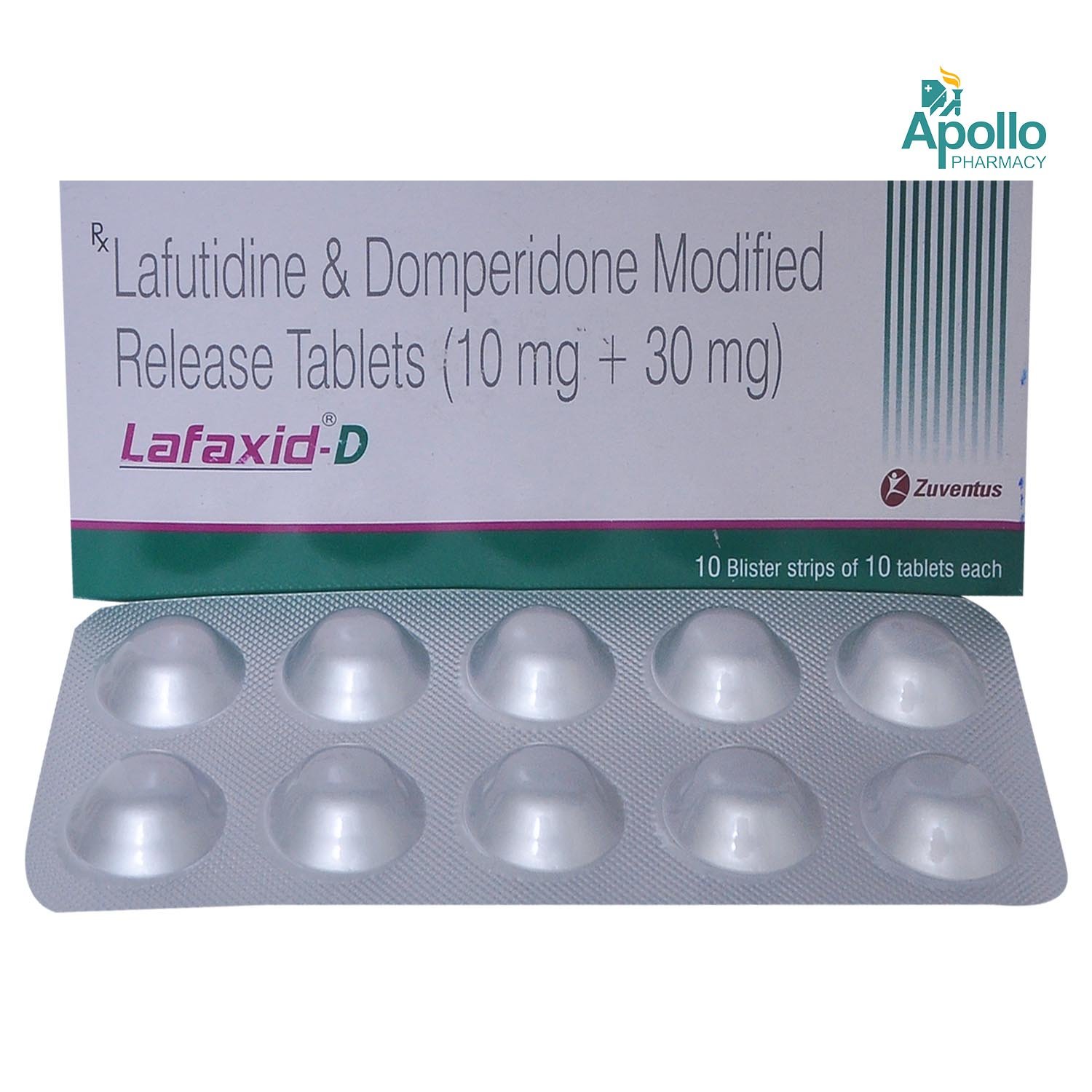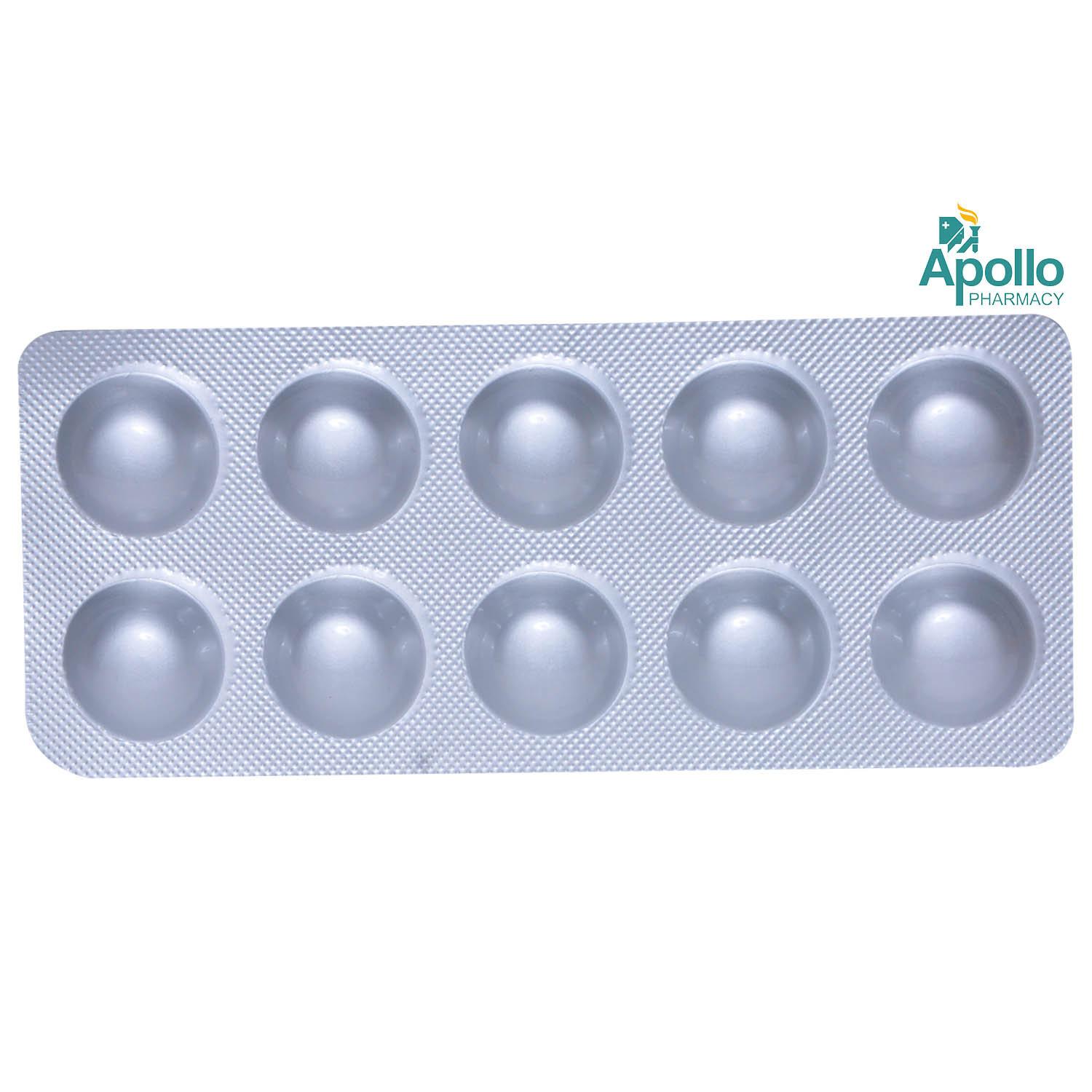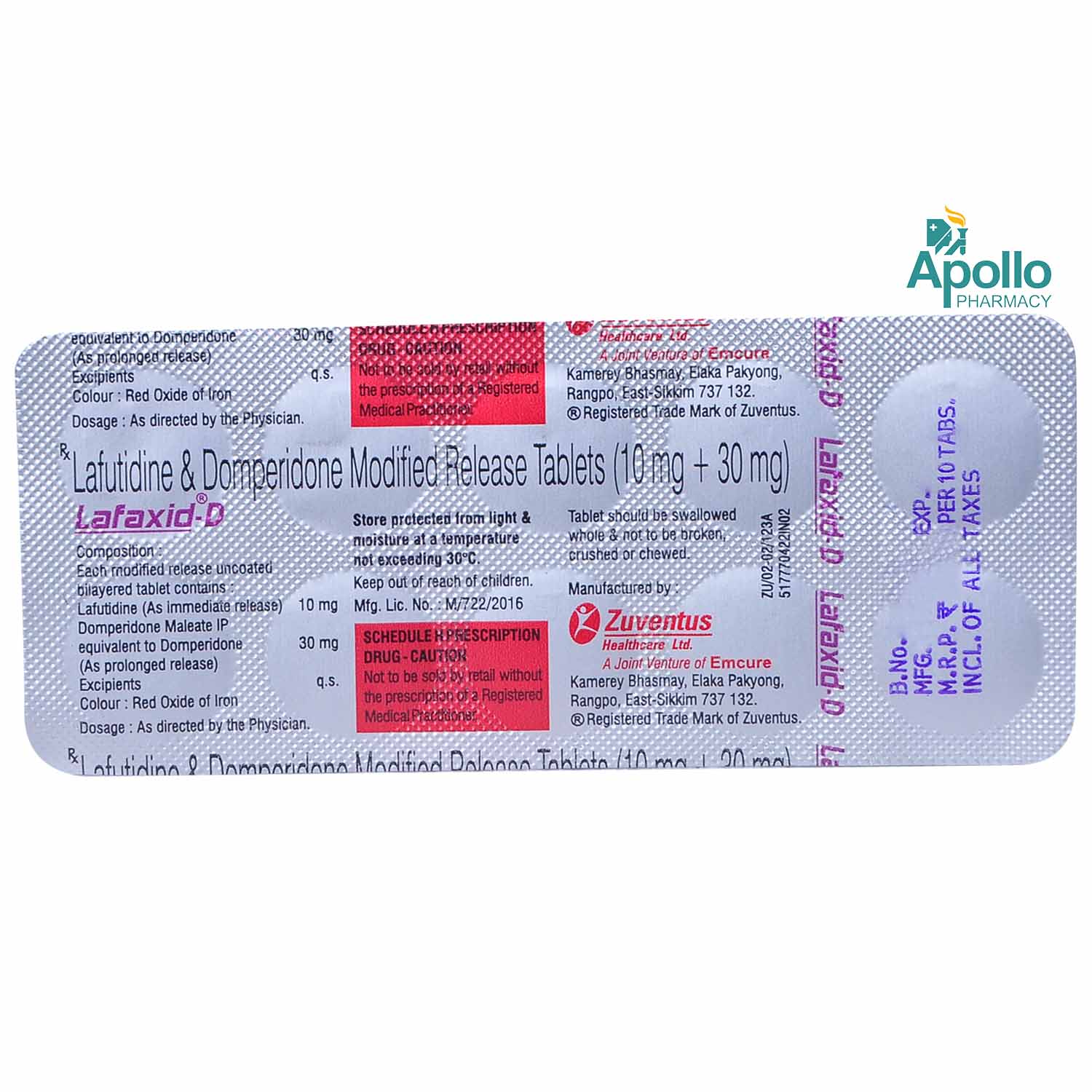Lafaxid-D Tablet 10's
MRP ₹131.5
(Inclusive of all Taxes)
₹19.7 Cashback (15%)
Provide Delivery Location
Online payment accepted
 Prescription drug
Prescription drugWhats That
Composition :
Manufacturer/Marketer :
Consume Type :
Expires on or after :
Return Policy :
About Lafaxid-D Tablet
Lafaxid-D Tablet belongs to a group of medicines called gastrointestinal agents used to treat gastro-oesophageal reflux disease (GERD) and peptic ulcers. Gastroesophageal reflux disease (GERD) occurs when stomach acid frequently flows back into the food pipe (oesophagus). Peptic ulcers are sores that develop on the inner lining of the intestine and stomach.
Lafaxid-D Tablet is a combination of two drugs: Lafutidine (H2 receptor antagonist) and Domperidone (a dopamine antagonist). Lafutidine works by blocking histamine H2 receptors located on the stomach lining, thereby reduces gastric acid secretion. Domperidone works by increasing the movements and contractions of stomach muscles.
You are advised to take Lafaxid-D Tablet for as long as your doctor has prescribed it for you depending on your medical condition. In some cases, you may experience certain common side-effects, such as nausea, diarrhoea, dryness in the mouth, headache, drowsiness, dizziness, increased liver enzymes, and increased uric acid level in the blood. Most of these side-effects do not require medical attention and will resolve gradually over time. However, you are advised to talk to your doctor if you experience these side-effects persistently.
Inform your doctor before taking Lafaxid-D Tablet if you have a history of gastrointestinal bleeding, intestinal obstruction, liver disease, kidney disease. Do not take Lafaxid-D Tablet if you are pregnant or breastfeeding unless prescribed by the doctor. Lafaxid-D Tablet may cause sleepiness and dizziness, so drive only if you are alert. Lafaxid-D Tablet should not be given to children as safety has not been established. Avoid consuming alcohol along with Lafaxid-D Tablet as it could lead to increased drowsiness and can elevate the production of stomach acid. Keep your doctor informed about all the medicines and your health condition to rule out any side-effects.
Uses of Lafaxid-D Tablet
Directions for Use
Key Benefits
Lafaxid-D Tablet belongs to a group of gastrointestinal agents used to treat gastro-oesophageal reflux disease (GERD) and peptic ulcers. Lafaxid-D Tablet is a combination of two drugs: Lafutidine (H2 receptor antagonist) and Domperidone (a dopamine antagonist). Lafutidine works by blocking histamine H2 receptors located on the stomach lining, thereby reduces gastric acid secretion. Domperidone works by increasing the movements and contractions of stomach muscles.
Storage
- Inform your doctor about dry mouth symptoms. They may adjust your medication regimen or prescribe additional medications to manage symptoms.
- Drink plenty of water throughout the day to help keep your mouth moist and alleviate dry mouth symptoms.
- Chew sugar-free gum or candies to increase saliva production and keep your mouth moisturized.
- Use saliva substitutes, such as mouthwashes or sprays, only if your doctor advises them to help moisturize your mouth and alleviate dry mouth symptoms.
- Avoid consuming smoking, alcohol, spicy or acidic foods, and other irritants that may aggravate dry mouth symptoms.
- Schedule regular dental check-ups to keep track of your oral health and handle any dry mouth issues as they arise.
Drug Warnings
Do not take Lafaxid-D Tablet if you are allergic to any of its contents. Inform your doctor before taking Lafaxid-D Tablet if you have a history of gastrointestinal bleeding or intestinal obstruction. Do not take Lafaxid-D Tablet if you are pregnant or breastfeeding unless prescribed by the doctor. Lafaxid-D Tablet may cause drowsiness and dizziness, so drive only if you are alert. Lafaxid-D Tablet should not be given to children as safety has not been established. Avoid consuming alcohol along with Lafaxid-D Tablet as it could lead to increased drowsiness and can elevate the production of stomach acid. The Lafaxid-D Tablet contains lafutidine which may mask gastric cancer symptoms, so Lafaxid-D Tablet should be taken only after confirming the tumour is not malignant.
Drug-Drug Interactions
Drug-Drug Interactions
Login/Sign Up
Coadministration of Lafaxid-D Tablet with Cisapride can increase the blood levels of Lafaxid-D Tablet.
How to manage the interaction:
There may be a possibility of interaction between Lafaxid-D Tablet and Cisapride, but it can be taken if prescribed by a doctor. In case you experience any side effects like swelling of the ankles or feet, unusual tiredness, redness, changes in menstrual ability, contact a doctor. It is recommended to do this to ensure your heart stays healthy. Do not stop using any medications without talking to a doctor.
Coadministration of Lafaxid-D Tablet with Methadone can Increase the risk of irregular heart rhythm.
How to manage the interaction:
Although taking Lafaxid-D Tablet and Methadone together can cause an interaction, it can be taken if your doctor has suggested it. If you experience lightheadedness, tiredness, increased heart rate, consult a doctor. Do not discontinue any medications without consulting a doctor.
Coadministration of Lafaxid-D Tablet with Clarithromycin can increase the risk of side effects.
How to manage the interaction:
There may be a possibility of interaction between Lafaxid-D Tablet and Clarithromycin, but it can be taken if prescribed by a doctor. Do not stop using any medications without talking to a doctor.
Coadministration of Lafaxid-D Tablet with Toremifene can Increase the risk of irregular heart rhythm.
How to manage the interaction:
Although taking Lafaxid-D Tablet and Toremifene together can cause an interaction, it can be taken if your doctor has suggested it. If you experience lightheadedness, tiredness, increased heart rate, consult a doctor. Do not discontinue any medications without consulting a doctor.
Coadministration of Lafaxid-D Tablet with Ketoconazole can Increase the risk of irregular heart rhythm.
How to manage the interaction:
Although taking Lafaxid-D Tablet and Ketoconazole together can cause an interaction, it can be taken if a doctor has suggested it. If you experience lightheadedness, tiredness, increased heart rate, consult a doctor. Do not discontinue any medications without consulting a doctor.
Coadministration of Lafaxid-D Tablet with Nefazodone can increase the blood levels of Lafaxid-D Tablet.
How to manage the interaction:
There may be a possibility of interaction between Lafaxid-D Tablet and Nefazodone, but it can be taken if prescribed by a doctor. In case you experience any side effects like swelling of the ankles or feet, unusual tiredness, redness, changes in menstrual ability, contact a doctor. It is recommended to do this to ensure your heart stays healthy. Do not stop using any medications without talking to a doctor.
Coadministration of Lafaxid-D Tablet with Citalopram can Increase the risk of irregular heart rhythm.
How to manage the interaction:
Although taking Lafaxid-D Tablet and Citalopram together can cause an interaction, it can be taken if your doctor has suggested it. If you experience lightheadedness, tiredness, increased heart rate, consult a doctor. Do not discontinue any medications without consulting a doctor.
Coadministration of Lafaxid-D Tablet with Ritonavir can increase the blood levels of Lafaxid-D Tablet.
How to manage the interaction:
There may be a possibility of interaction between Lafaxid-D Tablet and Ritonavir, but it can be taken if prescribed by a doctor. In case you experience any side effects like swelling of the ankles or feet, unusual tiredness, redness, changes in menstrual ability, contact a doctor. It is recommended to do this to ensure your heart stays healthy. Do not stop using any medications without talking to a doctor.
Coadministration of Lafaxid-D Tablet with Halofantrine can Increase the risk of irregular heart rhythm.
How to manage the interaction:
Although taking Lafaxid-D Tablet and Halofantrine together can cause an interaction, it can be taken if your doctor has suggested it. If you experience lightheadedness, tiredness, increased heart rate, consult a doctor. Do not discontinue any medications without consulting a doctor.
Combining Mizolastine with Lafaxid-D Tablet can increase the risk or severity of irregular heart rhythms.
How to manage the interaction:
Although taking Lafaxid-D Tablet and Mizolastine together can cause an interaction, it can be taken if your doctor has suggested it. However, if you experience sudden dizziness, lightheadedness, fainting, shortness of breath, chest pain or tightness, rapid heartbeat, contact a doctor immediately. Do not discontinue any medications without consulting a doctor.
Drug-Food Interactions
Drug-Food Interactions
Login/Sign Up
Diet & Lifestyle Advise
- Eat smaller meals more often.
- Avoid smoking and alcohol consumption. Alcohol intake leads to increased production of stomach acid, thereby increases acidity and heartburn.
- Maintain a healthy weight by regular exercising.
- Avoid lying down after eating.
- Avoid tight-fitting clothes.
- Maintain a healthy weight by regular exercising.
- Practice relaxation techniques and avoid stress by doing yoga or meditation.
- Avoid foods such as high-fat food, spicy food, chocolates, citrus fruits, pineapple, tomato, onion, garlic, tea, and soda.
- Avoid sitting continuously as it may trigger acidity. Take a break of 5minutes break every hour by doing brisk walking or stretching
Side Effects of Lafaxid-D Tablet
- Nausea
- Dryness in mouth
- Headache
- Drowsiness
- Dizziness
- Protein in urine
- Increased uric acid level in the blood
Habit Forming
Therapeutic Class
All Substitutes & Brand Comparisons
RX
Out of StockFutaden D 10 mg/30 mg Tablet
Emcure Pharmaceuticals Ltd
₹99
(₹8.91 per unit)
24% CHEAPER
Drug-Diseases Interactions
Drug-Diseases Interactions
Login/Sign Up
FAQs
Lafaxid-D Tablet is a combination of two drugs: Lafutidine (H2 receptor antagonist) and Domperidone (a dopamine antagonist). Lafutidine works by blocking histamine H2 receptors located on the stomach lining, thereby reduces gastric acid secretion. Domperidone works by increasing the movements and contractions of stomach muscle. Together, Lafaxid-D Tablet helps in relieving symptoms of gastroesophageal reflux disease.
Talk to your doctor if you do not feel better even after taking Lafaxid-D Tablet for 7 days. Do not take Lafaxid-D Tablet for longer durations unless prescribed by the doctor.
Constipation might be a side-effect of Lafaxid-D Tablet . Drink enough fluids and eat fibre rich food if you experience constipation.
Avoid lying down immediately after meals to prevent acid reflux. Raise the head of the bed 10-20cm by putting a pillow so that the head and chest are above the waist. This helps in preventing acid reflux.
Dry mouth could be a side-effect of Lafaxid-D Tablet . Limiting caffeine intake, avoiding smoking and mouthwashes containing alcohol, drinking water regularly, and chewing sugar-free gum/candy might stimulate saliva and prevent drying of the mouth.
Lafaxid-D Tablet contains domperidone which helps in treating nausea and vomiting. However, Lafaxid-D Tablet is used to treat acidity related conditions. Please consult your doctor, he/she may prescribe you an alternate medicine for treating nausea and vomiting.
Drug-Drug Interactions Checker List
- KETOCONAZOLE
- FLUCONAZOLE
- POSACONAZOLE
- SAQUINAVIR
- DARUNAVIR
- BEPRIDIL
- TERFENADINE
- SPARFLOXACIN
- PIPERAQUINE
Special Advise
Disease/Condition Glossary
The stomach is usually protected from the acid by a mucous layer. In some cases, due to excess acid production, the mucous layer gets eroded, which leads to complications like GERD, acidity, and peptic ulcers. Gastroesophageal reflux disease (GERD) occurs when stomach acid frequently flows back into the food pipe (oesophagus). This backflow (acid reflux) irritates the food pipe and causes heartburn. Symptoms include heartburn, sour or bitter taste in the mouth, and difficulty swallowing.
Peptic ulcers are sores that develop on the lining of the stomach and intestine due to erosion of stomach protective lining. Symptoms include nausea, changes in appetite, bloody or dark stools, unexplained weight loss, vomiting, and indigestion.

Have a query?
Alcohol
Safe if prescribed
Avoid consumption of alcohol while taking Lafaxid-D Tablet . Alcohol intake leads to increased production of stomach acid, thereby increases acidity and heartburn.
Pregnancy
Consult your doctor
Consult your doctor before taking Lafaxid-D Tablet if you are pregnant; your doctor will prescribe only if the benefits outweigh the risks.
Breast Feeding
Consult your doctor
Consult your doctor before taking Lafaxid-D Tablet ; your doctor will decide whether Lafaxid-D Tablet can be taken by breastfeeding mothers or not.
Driving
Safe if prescribed
Lafaxid-D Tablet may cause dizziness and sleepiness. Do not drive or operate machinery unless you are alert.
Liver
Consult your doctor
Dose adjustment may be needed. Consult your doctor before taking Lafaxid-D Tablet if you have a liver impairment or any concerns regarding this.
Kidney
Consult your doctor
Dose adjustment may be needed. Consult your doctor before taking Lafaxid-D Tablet if you have kidney impairment or any concerns regarding this.
Children
Safe if prescribed
Lafaxid-D Tablet should not be given to children as the safety and effectiveness were not established.

